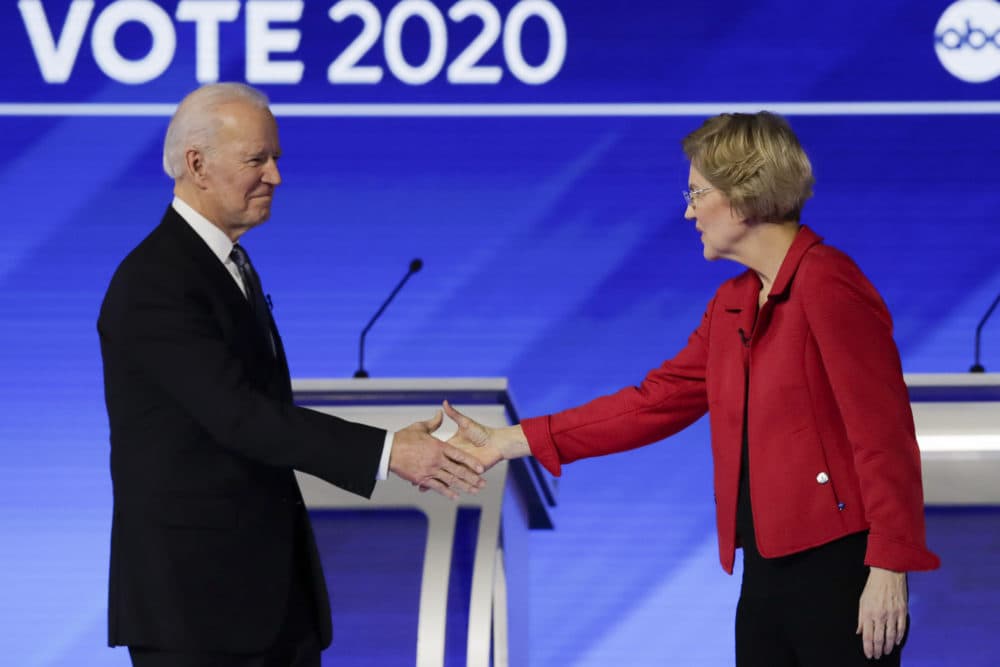Advertisement
Warren Has The Clout To Be President Biden's Biggest Progressive Ally — And Critic
Resume
During her presidential campaign, Elizabeth Warren argued that a bold, progressive agenda was the surest way to defeat Donald Trump — and to help Americans in need. She argued that "if Democrats played it safe — then Democrats will lose."
"We win when we have big enough ideas to meet the big problems in people’s lives and we get out there and fight for them," she said at a campaign event in New Hampshire more than a year ago.
Again and again, she warned against the kind of moderate vision offered by Joe Biden. But now, with Biden in the White House, Warren is embracing the new president as a progressive ally.
"President Biden and Vice President Kamala Harris ran on the most progressive agenda in modern history," Warren told WBUR recently.
Just as she did when she was running for president last year, Warren is still pushing a number of progressive policies — from a wealth tax, to canceling student debt, to a $15 minimum wage. The difference now is that the Massachusetts senator has an ally in the White House.

While Warren shares a number of policy goals with Biden, she's also willing to use her progressive clout to try to push the new president further to the left. A case in point: her proposed wealth tax. Warren's plan would impose a 2% tax on individual wealth above $50 million and 3% on fortunes over a $1 billion. The proposal was at the center of Warren's presidential campaign, and now that she sits on the powerful Senate Finance Committee, she plans to introduce a bill to make it the law.
"The idea behind that is just to bring in money to make investments in our future," Warren told WBUR, adding that the tax on the estates of the super-rich would help pay for everything from universal childcare to free public college to canceling student loan debt. More moderate Democrats, including Larry Summers, who directed the National Economic Council under Barack Obama, have panned the proposal as unworkable and probably unconstitutional. Summers has called the tax "confiscatory," arguing that it would only encourage billionaires to hide their assets.
"Pointing to billionaires and saying we should take their money away may feel good, but it's an ineffective political strategy," Summers said.
Warren is quick to dismiss such criticism: "Get with the program here, Larry," she said with a chuckle to WBUR. "What's your better idea? Look, there are many, many economists who disagree with Larry on this. And it's kind of like saying, 'Gee, rich people will figure out how to cheat on their taxes so let's not even try to tax them.' "
But Biden has not embraced a wealth tax either. While he ran on a promise to raise taxes substantially on the richest Americans, he would not tax accumulated wealth as Warren would.
Another issue on which Warren and Biden are not completely aligned is how to address the student loan debt crisis. Some 45 million Americans owe, on average, more than $37,000, which Warren calls a "crushing burden." She is pushing an effort to allow Americans to cancel up to $50,000 of student loan debt.
"It's people who can't move out of their parents' home," she said. "It's people who can't buy their own home... It's the people who aren't able to start small businesses because they [have to] make that monthly nut on their student loan payment."
Addressing this particular issue is a major priority for progressives, including Massachusetts Congresswoman Ayanna Pressley, who spoke recently about her own experience with student loan debt, which hits Black and brown students especially hard.
"Like so many of those students, I also defaulted on those loans," Pressley said during a press conference organized by the American Federation of Teachers. "Black and brown students are five times more likely to default on those loans than our white counterparts."
Biden's student loan forgiveness plan is less ambitious than Warren's; the president wants to forgive up to $10,000 of student debt, and make public colleges and universities tuition-free. But at a recent CNN town hall, a member of the audience pressed the president to embrace "at least" a $50,000 minimum. "When will you make that happen?" she demanded to know.
"I will not make that happen," Biden responded. "It depends on whether you go to private university or a public university."
Biden is sympathetic to the cause, but argues that the debt relief should be more focused on the people who really need it — as opposed to "people who have gone to Harvard and Yale and Penn." But Warren pushes back and says her more ambitious plan would help address racial inequality.
"There is no single act that the president could take on his own to narrow that racial wealth gap that would have as big an impact as canceling $50,000 of student loan debt," Warren told WBUR.
"I want to see President Biden [and] Vice President Harris to continue to meet the moment. And I'm always going to be pushing them hard to do more, and I'm going to cheerlead when they do."
Sen. Elizabeth Warren
Warren's stature as a respected policy expert on the left means she can push back against Biden, even as she remains his ally. That doesn't mean she will always get her way, but Jeff Hauser, of the Revolving Door Project, a progressive group that scrutinizes executive appointments, says she does have the president's ear. Hauser points out that a number of people with strong ties to Warren are already working in the treasury department and the executive branch — which adds to her considerable clout with the president.
"I think Biden respects her as both someone who has academic chops as well as a significant record of political accomplishment," Hauser said. "And I think her presidential campaign has further made her a national force to be reckoned with."
Warren told WBUR that she sees her role as both ally and critic to the president — as he tackles a pandemic, an economic crisis and an historic racial reckoning.
"I want to see President Biden [and] Vice President Harris to continue to meet the moment," she said. "And I'm always going to be pushing them hard to do more, and I'm going to cheerlead when they do."
This segment aired on February 25, 2021.
